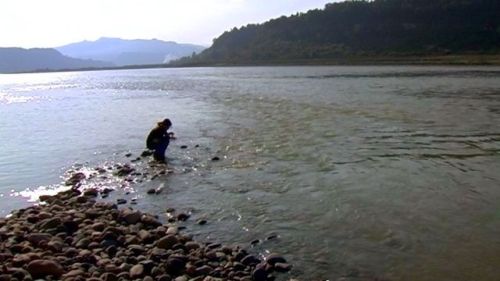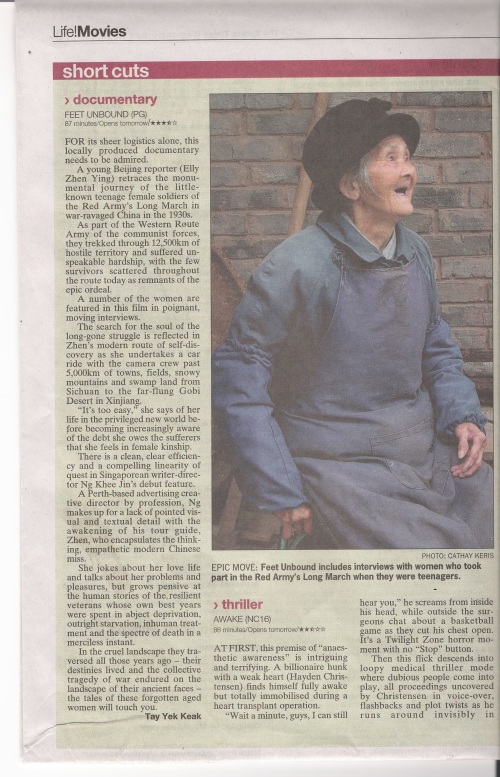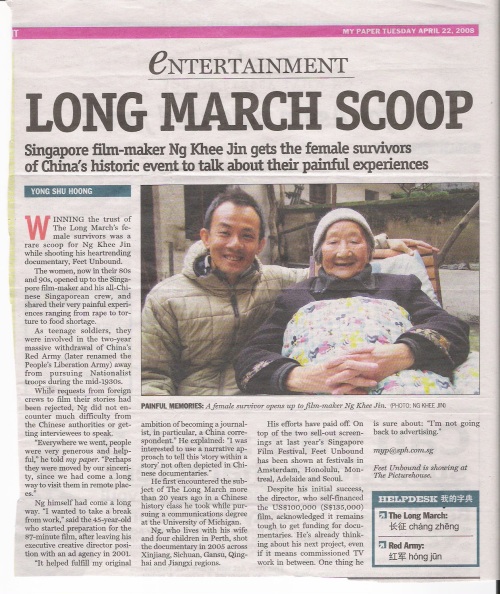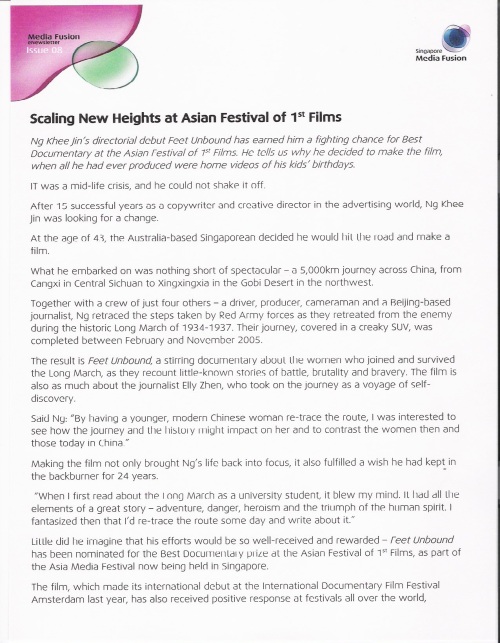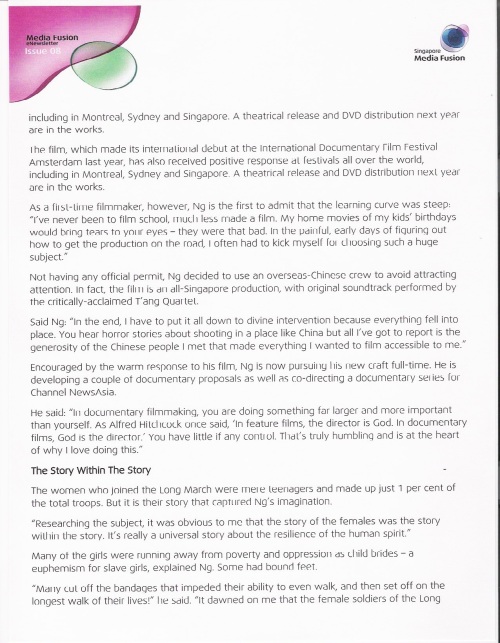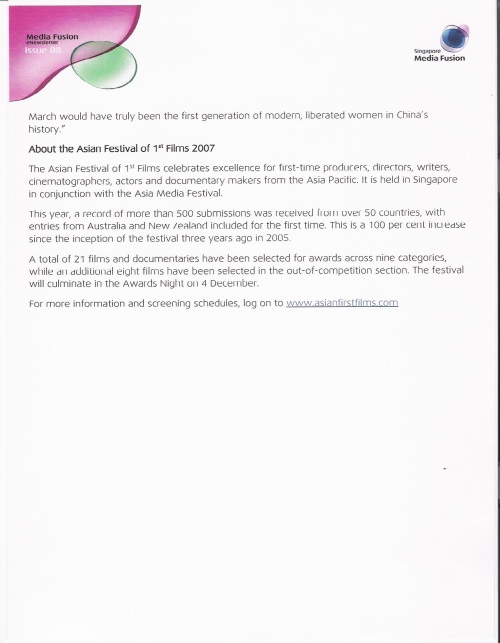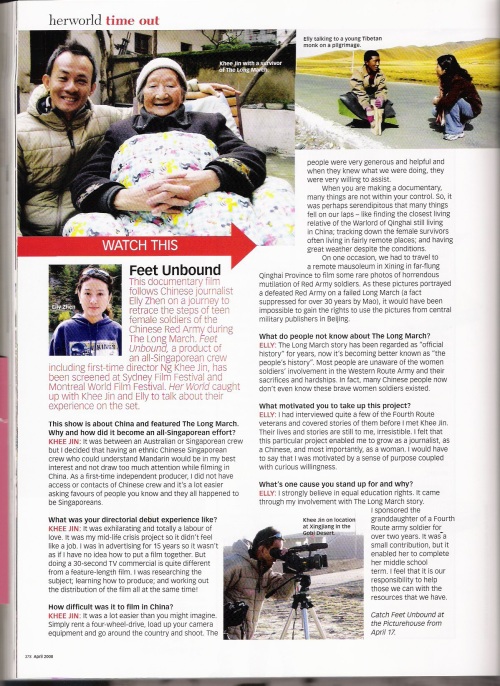by Stefan S
Today marked the Asian premiere of Ng Khee Jin’s documentary Feet Unbound, which recounts the Red Army’s Long March in China during tumultuous times in China after the collapse of the Qing Dynasty. It was a military retreat of over 200,000 troops on foot over 12,500 kilometres which lasted for almost 3 years, and the film looks at the event from the point of view of the female survivors, as well as the narrator Elly, a journalist from Beijing.
In a way, the documentary doesn’t run along conventional presentation. You would expect a documentary to be the mouthpiece of the filmmaker, adopting the filmmaker’s point of view, and everything else that fell into place, comes from the director himself. However Feet Unbound provided another parallel perspective, and that’s from Elly, who’s also in turn interviewed to share her thoughts. So while the director had a vision at the helm, a separate voice was added, and thus it may seem at times to contain a separate narrative.
The gems were of course the interviews with the women survivors of the Long March. In their twilight years, they still possess some spunk as they recollect their experiences, and watching them tell their stories in an animated manner, you can’t help but wonder how passionate they were really like back at their peak. Some shared and sang a number of the propaganda songs used to boost morale during the difficult times, and you’ll feel their pain when they tell of the hardships of the time, as well as the frequent hunger pangs from the lack of food, fighting three different battle fronts as they battle against the Guomingtang troops, the warlords, as well as Mother Nature.
This is a very technically sound documentary, and it captures the picturesque landscapes of rural China beautifully. I like the soundtrack especially, an original composition which was performed by the renowned Tang Quartet. The last time I saw the Quartet in action was during a Coco Lee concert in Singapore back in 2000, and I wonder if there would be anymore local films who will tap on the Quartet for film soundtracks.
Chinese women of noble births had their feet bounded to keep it small. Some say it was for aesthetics, as it made walking quite difficult – balancing and all – and those with big feet are automatically labelled as the peasants as they need to work the fields. Those who took part in the March naturally had their feet unbound, and signalled probably for the first time, the women being able to exercise their freedom of choice – to join the movement based on the promise to better their lot.
Elly,in her journey to retrace the steps taken, pales in comparison obviously as most of the travelling was done in a chauffered SUV versus the journey made on foot. Despite the length of travel, this documentary remained very palatable in its compact runtime, and the many precious anecdotes peppered throughout made it extremely watchable.
***
Director Ng Khee Jin was present to grace the occassion of Feet Unbound’s Asian Premiere, and to him it was a special one as it’s like a homecoming for the film. While technically an Australian production, he added that it’s entirely made by a Singapore production crew.
There were questions about the narrative of Elly included in the film, as a reporter on her own trip, with impressions taken from her journal. Somehow the director-writer’s voice didn’t come through, or not as clear – so the question was, whose voice was it meant to be for the audience to follow. Khee Jin explained that the film was unscripted, and it was a conscious decision to introduce the voice of a younger woman and her impressions of the Long March, besides hearing first hand accounts from the older women survivors, who were there to recount history from their perspective.
Khee Jin shared that the filming was done over a year, with pre-production carried out over 4 to 5 weeks, while actual filming took place over 8 to 9 weeks. The biggest challenge he faced was when the original talent (Elly was actually the replacement) had to back out of the production days when they were starting to shoot. She was a reporter from Xinhua News Agency, and because of some breaking news she had to cover, she couldn’t take leave. Khee Jin freaked out, though that reporter introduced Elly, and the result is this film. Other challenges he faced had paled in comparison.
Khee Jin also revealed that the idea behind including Elly’s personal life, with the matchmaking and her dalliances with relationships, was actually not to tell a simple, straight, direct story. He wanted to include a perspective from what a typical modern Chinese woman is like, as compared to the women on the Long March – who were truly the first generation of the modern Chinese woman, with the promise of equal rights. He wanted to show how China had moved on, and to essentially contrast the evolution of the Chinese woman. He made Elly keep a journal of her experiences each day, and discovered there was a parallel story from the journal entries, where she was at a point of her career where she’s losing interest.
There were some in the audience who were repulsed by Elly’s character (probably the perceived promiscuity, and her open attitudes toward flirting and sex), and for Khee Jin, it was an eye-opener to be together with the audience to feel their reactions – the Chinese crowd tend to loathe Elly, while the Western audiences were actually fascinated by her character. These were obvious differing reactions, as are some points at which the audience cracked up.
In the film, there was an archival black and white clip used quite often cited from “WanShuiQianShan” (1959) (which literally translates to “ten thosand waters and thousand mountains”), an early propaganda film which Khin Jin thought to be the best one about the Long March, and he used it in Feet Unbound to show some aspects of the actual event.
Feet Unbound is Khee Jin’s first film, and a personal project of sorts. When asked if he had faced any objections from the Chinese authorities, Khee Jin said that it was shot without a permit! The initial point of inspiration was when he first read about the Long March about 20+ years back, and from the two books which was listed in the end credits as having inspired the film, Khee Jin mentioned that they were probably the only 2 books out there which was about women in the Long March.
http://anutshellreview.blogspot.com/2007/04/siff-feet-unbound-asian-premiere.html
